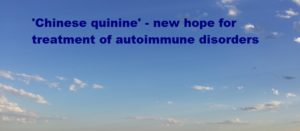Anti-malarial medications and autoimmunity.
Malaria is a parasitic infection carried by mosquitoes in many tropical areas of the globe. Anti-malarial drugs are not only effective against malaria but they can also balance the immune system and reduce strong pro-inflammatory molecules involved in many autoimmune disorders.
Quinine was the first anti-malarial medication, isolated from cinchona bark. Since then many quinine related medications were synthesized. Quinine is also used in treatment of lupus, arthritis and the restless leg syndrome. Tonic water contains very small amounts of quinine.
Hydroxychloroquine is a quinine related compound originally used as an anti-malarial. It is also sold under the name Plaquenin, Axemal (in India), Dolquine and Quensyl.
Hydroxychloroquine is often given to people with autoimmune disorders such as lupus erythematosus and rheumatoid arthritis. Rheumatoid arthritis is the most common autoimmune disorder coexisting with thyroid autoimmunity, about 3-4% of people with GD and HT also have rheumatoid arthritis and hydroxychloroquine is often prescribed.
Sometimes, doctors prescribe Hydroxychloroquine (Plaquenil) for Hashimoto’s thyroiditis with positive results. It seems to be a slow acting medication. Trials are being undertaken to determine the exact effect of Hydroxychloroquine treatment in Hashimoto’s Thyroiditis.
This medication is not used to treat thyroid autoimmunity as such and there are no current studies that I could find in regards to Hydroxychloroquine and thyroid autoimmunity.
Halofuginone is a very promising agent for treatment for many autoimmune disorders. It is a plant alkaloid. Scientists are looking at its effects on autoimmunity and studies look very positive. It is currently used to treat malaria and scleroderma, an autoimmune disease of the connective tissue. It was isolated from a root of a plant called Dichroa febrifuga, ‘Chinese quinine’, (a blue evergreen hydrangea which grows in Tibet and Nepal) and had been used to treat malaria for thousands of years in China. This compound protects plant from stress and is more powerful than quinine. Halofuginone is also used in veterinary medicine to treat coccidiosis (protozoa parasites).
Researchers have discovered that halofuginone blocks the development of harmful immune cells called Th17 which are believed to be strongly involved in generation of autoimmunity. Halofuginone only affects these harmful immune cells and its action is to restrict amino acids proline incorporation into proteins (8). Proline deprivation blocks TH17 cells generation. TH17 immune cells are implicated in many autoimmune diseases such as inflammatory bowel disease, rheumatoid arthritis, multiple sclerosis, and psoriasis. Preliminary animal studies look very positive for Graves’ disease.
An animal study (3) has shown that Halofuginone decreased the incidence of autoimmune thyroid disease in mice in which Graves’ disease was induced.
As anti-malarial drugs have been prescribed to patients with autoimmunity, let’s look at the possible actions of these drugs on the immune system, although the way they work is not completely known.
Anti-malarial medications such as quinine are believed to be effective against Mycoplasma microorganism infections which have been implicated as possible causative agents of autoimmunity (including thyroid autoimmunity).
Patients with Graves’ disease were shown to have increased levels of Plasmacytoid Dendritic Cells (pDCs) in perithyroidal lymph nodes. These cells are the eyes of the immune system and they produce strong pro-inflammatory cytokines, such as IFNα and IFNβ. They are believed to be important in production of auto-antibodies. These cytokines can influence the central thymic tolerance to Thyroid Stimulating Hormone Receptor which may lead to Graves’ disease.
Hydroxychloroquine can reduce TLR (Toll like Receptor) signalling on pDCs. It impairs production of strong pro-inflammatory molecules such as INFα. It is therefore an immunosuppressant and that is why it is used in the treatment of some autoimmune disorders.
Anti-malarial medications which are alkaloids may alter pH within vesicles in immune cells called macrophages or other antigen-presenting cells which may influence the immune response to auto-antigens (6).
References:
- Road back foundation. Mycoplasmas and Autoimmune Diseases. URL: http://www.roadback.org/blog/mycoplasmas-autoimmune-diseases/#_edn2
- https://www.ehealthme.com/ds/plaquenil/graves-disease/
- Hou X, Zhou J, Yang R, Liu S, Bi M, Liu T, Fan C, Guan H, Teng W, Shan Z, Li Y. Effect of Halofuginone on the Pathogenesis of Autoimmune Thyroid Disease in Different Mice Models. Endocr Metab Immune Disord Drug Targets. 2017;17(2):141-148
- Jorge Cárdenas Roldán, Jenny Amaya-Amaya, Juan Castellanos-de la Hoz, Juliana Giraldo-Villamil, Gladys Montoya-Ortiz, Paola Cruz-Tapias, Adriana Rojas-Villarraga, Rubén D. Mantilla and Juan-Manuel Anaya. Autoimmune Thyroid Disease in Rheumatoid Arthritis: A Global Perspective. Arthritis. 2012; 2012: 864907.
- Ben-Zvi I, Kivity S, Langevitz P, Shoenfeld Y. Hydroxychloroquine: from malaria to autoimmunity. Clin Rev Allergy Immunol. 2012 Apr;42(2):145-53
- Fox R. Anti-malarial drugs: possible mechanisms of action in autoimmune disease and prospects for drug development. Lupus. 1996 Jun; 5 Suppl 1:S4-10.
- Karim Sacre, Lindsey A. Criswell, and Joseph M. Hydroxychloroquine is associated with impaired interferon-alpha and tumor necrosis factor-alpha production by plasmacytoid dendritic cells in systemic lupus erythematosus. Arthritis Res Ther. 2012; 14(3): R155
- Sundrud MS, Koralov SB, Feuerer M, Calado DP, Kozhaya AE, Rhule-Smith A, Lefebvre RE, Unutmaz D, Mazitschek R, Waldner H, Whitman M, Keller T, Rao A. Halofuginone inhibits TH17 cell differentiation by activating the amino acid starvation response. Science. 2009 Jun 5; 324(5932):1334-8.

